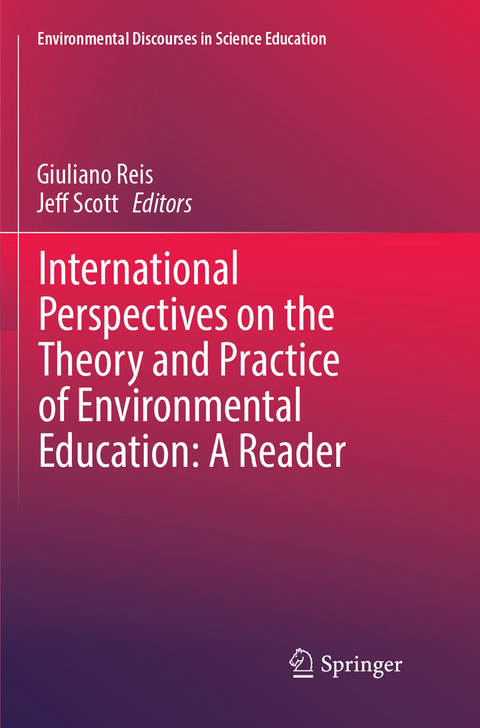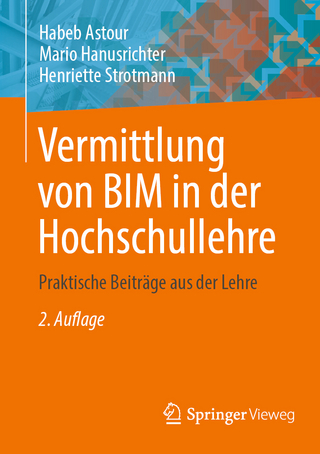
International Perspectives on the Theory and Practice of Environmental Education: A Reader
Springer International Publishing (Verlag)
978-3-319-88477-6 (ISBN)
The present book shares critical perspectives on the conceptualization, implementation, discourses, policies, and alternative practices of environmental education (EE) for diverse and unique groups of learners in a variety of international educational settings. Each contribution offers insights on the authors' own processes of re-imagining an education in/about/for the environment that are realized through their teaching, research and other ways of "doing" EE. Overall, environmental education has been aimed at giving people a wider appreciation of the diversity of cultural and environmental systems around them as well as the urge to overcome existing problems. In this context, universities, schools, and community-based organizations struggle to promote sustainable environmental education practices geared toward the development of ecologically literate citizens in light of surmountable challenges of hyperconsumerism, environmental depletion and socioeconomic inequality. The extent that individuals within educational systems are expected to effectively respond to-as well as benefit from-a "greener" and more just world becomes paramount with the vision and analysis of different successes and challenges embodied by EE efforts worldwide. This book fosters conversations amongst researchers, teacher educators, schoolteachers, and community leaders in order to promote new international collaborations around current and potential forms of environmental education.
This book reflects many successful international projects and perspectives on the theory and praxis of environmental education. An eclectic mix of international scholars challenge environmental educators to engage issues of reconciliation of correspondences and difference across regions. In their own ways, authors stimulate critical conversations that seem pivotal for necessary re-imaginings of research and pedagogy across the grain of cultural and ecological realities, systematic barriers and reconceptualizations of environmental education. The book is most encouraging in that it works to expand the creative commons for progress in teaching, researching and doing environmental education in desperate times.
- Paul Hart, Professor of Science and Environmental Education at the University of Regina (Canada), Melanson Award for outstanding contributions to environmental and outdoor education (Saskatchewan Outdoor and Environmental Education Association) and North American Association for Environmental Education (NAAEE)'s Jeske Award for Leadership and Service to the Field of EE and Outstanding Contributions to Research in EE.
In an attempt to overcome simplistic and fragmented views of doing Environmental Education in both formal and informal settings, the collected authors from several countries/continents present a wealth of cultural, social, political, artistic, pedagogical, and ethical perspectives that enrich our vision on the theoretical and practicalfoundations of the field. A remarkable book that I suggest all environmental educators, teacher educators, policy and curricular writers read and present to their students in order to foster dialogue around innovative ways of experiencing an education about/in/for the environment.
- Rute Monteiro, Professor of Science Education, Universidade do Algarve/ University of Algarve (Portugal).
Chapter 1: Introducing the book, Giuliano Reis (University of Ottawa) and Jeff Scott (Nipissing University).- ENVIRONMENTAL EDUCATION AND TEACHER EDUCATION.- Chapter 2: Understanding ecojustice education as a praxis of environmental reconciliation: Teacher education, indigenous knowledges, and relationality, Jesse Butler, Nicholas Ng-A-Fook, Rita Forte, Ferne McFadden and Giuliano Reis (University of Ottawa).- Chapter 3: Reimagining environmental education as artistic practice, Hillary Inwood (OISE, University of Toronto) and Elizabeth Ashworth (Nipissing University).- Chapter 4: Integration, inquiry, and interpretation: A learning garden alternative placement and eco-mentorship program for pre-service teachers, Kelly Young (Trent University) and Darren Stanley (University of Windsor).- Chapter 5: Embedding environmental sustainability in a predominantly online teacher education program: ways to contextualise learning, Deborah Prescott (Charles Darwin University).- ENVIRONMENTAL EDUCATION OUTSIDE WALLS.- Chapter 6: Educating for student agency: Perspectives from young eco-civic leaders in Canada, Lisa Glithero (University Of Ottawa).- Chapter 7: Environmental education as/for environmental consciousness raising: Insights from an Ontario outdoor education centre, Joanne Nazir (Redeemer University College) and Erminia Pedretti (OISE, University of Toronto).- Chapter 8: Indonesian adventures: Developing an ecology of place on Sulawesi Utara, Vajiramalie Perera (Simon Fraser University), Wiske Rotinsulu (Universitas Sam Ratulangi), John Tasirin (Universitas Sam Ratulangi) and David Zandvliet (Simon Fraser University).- ENVIRONMENTAL EDUCATION IN THE CONTEXT OF SCHOOLS.- Chapter 9: Crisis and recovery in environmental education: The case of Greece, Constantinos Yanniris (McGill University) and Myrto Kalliopi Garis (Université de Montréal).- Chapter 10: Storied environmental curriculum: A case-based perspective on environmental education, Alandeom W. Oliveira (SUNY at Albany).- Chapter 11: A socioscientific issues approach to environmental education, Benjamin C. Herman (University of Missouri), Troy D. Sadler (University of Missouri), Dana L. Zeidler (University of South Florida) and Mark Newton (California State University).- Chapter 12: Moving forward from the margins: Education for sustainability in Australian early childhood contexts, Sue Elliott (University of New England) and Julie Davis (Queensland University of Technology).- Chapter 13: Environmental education in China: A case study of four elementary and secondary schools, Qin Chengqiang, Xiong Ying, Feng Yan and Li Tian (Guangxi University).- ENVIRONMENTAL EDUCATION RESEARCH AND POETRY.- Chapter 14: An improbable international collaboration: Finding common ground, Astrid Steele (Nipissing University) and Wafaa M. Abd-El-Aal (Beni-Suef University).- Chapter 15: Environmental education research and the political dimension of education for citizenship: The Brazilian context, Luiz Marcelo de Carvalho and Heluane Aparecida Lemos de Souza (Universidade Estadual Paulista).- Chapter 16: Black earth green moon Mama Allpa: Polyphonic moments from temple to tambo, Pat Palulis (University of Ottawa).
| Erscheint lt. Verlag | 9.9.2018 |
|---|---|
| Reihe/Serie | Environmental Discourses in Science Education |
| Zusatzinfo | XXVI, 236 p. 70 illus. |
| Verlagsort | Cham |
| Sprache | englisch |
| Maße | 155 x 235 mm |
| Gewicht | 409 g |
| Themenwelt | Recht / Steuern ► EU / Internationales Recht |
| Sozialwissenschaften ► Pädagogik ► Erwachsenenbildung | |
| Schlagworte | ecojustice • education for sustainable development • Environmental Awareness • Environmental education • environmental instruction • environmental learning • Global Education • Indigenous knowledge • Learning and Instruction • Outdoor Education • Pre-Service Education • science education • Socioscientific Issues • Sustainability education • Sustainabilty • teacher training • theory and practice of environmental education • youth agency |
| ISBN-10 | 3-319-88477-8 / 3319884778 |
| ISBN-13 | 978-3-319-88477-6 / 9783319884776 |
| Zustand | Neuware |
| Haben Sie eine Frage zum Produkt? |
aus dem Bereich


